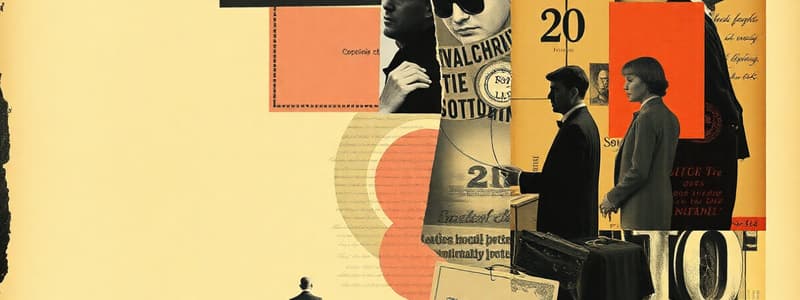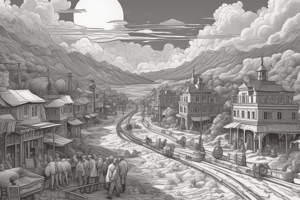Podcast
Questions and Answers
Which factor contributed to Collins' unique perspective on sociological theory?
Which factor contributed to Collins' unique perspective on sociological theory?
- His early adoption of academic trends and fashions.
- His focus on micro-level interactions, ignoring macro-level forces.
- His strict adherence to dominant theoretical paradigms.
- His experiences growing up in post-war Europe and witnessing geopolitical dynamics. (correct)
Collins's work is widely recognized and celebrated within mainstream sociological theory.
Collins's work is widely recognized and celebrated within mainstream sociological theory.
False (B)
What major historical event significantly reshaped the character of the American polity, influencing sociological perspectives like Collins's?
What major historical event significantly reshaped the character of the American polity, influencing sociological perspectives like Collins's?
Vietnam War
Before returning to academia at the University of Virginia, Collins initially decided to become a professional _________.
Before returning to academia at the University of Virginia, Collins initially decided to become a professional _________.
What intellectual movement did Collins actively participate in during his time at Berkeley?
What intellectual movement did Collins actively participate in during his time at Berkeley?
Match the person with the place they taught Collins:
Match the person with the place they taught Collins:
Before switching focus, what did Collins initially study at Harvard?
Before switching focus, what did Collins initially study at Harvard?
American sociology was immediately receptive to international perspectives before World War II.
American sociology was immediately receptive to international perspectives before World War II.
Which of the following best describes 'collective effervescence' according to interaction ritual theory?
Which of the following best describes 'collective effervescence' according to interaction ritual theory?
Interaction ritual theory primarily focuses on macro-level social structures rather than micro-level interactions.
Interaction ritual theory primarily focuses on macro-level social structures rather than micro-level interactions.
According to interaction ritual theory, what is 'forward panic' in the context of violent situations?
According to interaction ritual theory, what is 'forward panic' in the context of violent situations?
Interaction ritual chains generate high emotional energy that is transformed into collective _______.
Interaction ritual chains generate high emotional energy that is transformed into collective _______.
Match the following concepts with their associated descriptions:
Match the following concepts with their associated descriptions:
Megachurches are presented as examples of what within the context of interaction ritual theory?
Megachurches are presented as examples of what within the context of interaction ritual theory?
A key criticism of Collins' work is that it successfully explains the inner processes of intellectual life.
A key criticism of Collins' work is that it successfully explains the inner processes of intellectual life.
What aspect of violent encounters does Collins' approach potentially overemphasize, according to critics?
What aspect of violent encounters does Collins' approach potentially overemphasize, according to critics?
According to critics, Collin's book sticks too closely to the _______ own understanding of the history of philosophy
According to critics, Collin's book sticks too closely to the _______ own understanding of the history of philosophy
Which area is notably lacking in Collin's analysis of emotional dynamics?
Which area is notably lacking in Collin's analysis of emotional dynamics?
Which theoretical perspective does Collins primarily use to analyze social phenomena?
Which theoretical perspective does Collins primarily use to analyze social phenomena?
Collins argues that educational attainment consistently and dramatically transforms patterns of social stratification.
Collins argues that educational attainment consistently and dramatically transforms patterns of social stratification.
According to Collins, what is a key characteristic that defines nation-states, beyond the legitimate use of violence?
According to Collins, what is a key characteristic that defines nation-states, beyond the legitimate use of violence?
Collins describes emotions as '______' that serve as the driving force of micro-social life.
Collins describes emotions as '______' that serve as the driving force of micro-social life.
Match the following concepts with their descriptions according to Collins' sociological framework:
Match the following concepts with their descriptions according to Collins' sociological framework:
What is Collins' view on the use of violence in face-to-face interactions?
What is Collins' view on the use of violence in face-to-face interactions?
Collins believes that sociology is an interpretive field incapable of producing cumulative, reliable findings.
Collins believes that sociology is an interpretive field incapable of producing cumulative, reliable findings.
According to Collins, what values does the U.S. public education system primarily reproduce?
According to Collins, what values does the U.S. public education system primarily reproduce?
Collins argues the pursuit of advanced degrees is rooted in a misguided expectation that such degrees lead to better-paid jobs and higher ______.
Collins argues the pursuit of advanced degrees is rooted in a misguided expectation that such degrees lead to better-paid jobs and higher ______.
In his analysis of intellectual networks, what does Collins debunk?
In his analysis of intellectual networks, what does Collins debunk?
According to Collins, the presence of external threats tends to decrease social cohesion within a nation-state.
According to Collins, the presence of external threats tends to decrease social cohesion within a nation-state.
What is the primary focus of Collins' work, 'The Micro-Foundations of Macro-Sociology'?
What is the primary focus of Collins' work, 'The Micro-Foundations of Macro-Sociology'?
Collins argues that human beings strive to maximize their ______ position.
Collins argues that human beings strive to maximize their ______ position.
In the context of intellectual networks, what does Collins emphasize about their internal structure?
In the context of intellectual networks, what does Collins emphasize about their internal structure?
Match the following concepts with their descriptions according to Collin's views on violence:
Match the following concepts with their descriptions according to Collin's views on violence:
Flashcards
Interaction Rituals
Interaction Rituals
High intensity interactions characterized by coordinated emotional actions among group members.
Emotional Energy
Emotional Energy
A powerful collective feeling generated through interaction that enhances group bonding.
Collective Euphoria
Collective Euphoria
A state when group members simultaneously share thoughts and actions, creating strong connections.
Megachurches
Megachurches
Signup and view all the flashcards
Forward Panic
Forward Panic
Signup and view all the flashcards
Criticism of Collins
Criticism of Collins
Signup and view all the flashcards
Micro-Level Analysis
Micro-Level Analysis
Signup and view all the flashcards
Emotional Dynamics
Emotional Dynamics
Signup and view all the flashcards
Historical Determinism
Historical Determinism
Signup and view all the flashcards
Philosophical Engagement
Philosophical Engagement
Signup and view all the flashcards
Collins' Contributions
Collins' Contributions
Signup and view all the flashcards
Life Background
Life Background
Signup and view all the flashcards
College Education
College Education
Signup and view all the flashcards
Political Activism
Political Activism
Signup and view all the flashcards
International Outlook
International Outlook
Signup and view all the flashcards
Geopolitical Sensitivity
Geopolitical Sensitivity
Signup and view all the flashcards
Macro-micro Interaction
Macro-micro Interaction
Signup and view all the flashcards
Vietnam War Impact
Vietnam War Impact
Signup and view all the flashcards
Collins' Civil Rights Participation
Collins' Civil Rights Participation
Signup and view all the flashcards
Macro-Political Aspects
Macro-Political Aspects
Signup and view all the flashcards
Micro-Foundations of Macro-Sociology
Micro-Foundations of Macro-Sociology
Signup and view all the flashcards
Conflict Theory
Conflict Theory
Signup and view all the flashcards
Cumulative Knowledge in Sociology
Cumulative Knowledge in Sociology
Signup and view all the flashcards
Status Struggle
Status Struggle
Signup and view all the flashcards
Legitimacy in Nation-States
Legitimacy in Nation-States
Signup and view all the flashcards
Heartland vs. Marchland
Heartland vs. Marchland
Signup and view all the flashcards
Violence: A Micro-Sociological Theory
Violence: A Micro-Sociological Theory
Signup and view all the flashcards
Education and Social Stratification
Education and Social Stratification
Signup and view all the flashcards
US Public Education System
US Public Education System
Signup and view all the flashcards
Sociology of Philosophies (1998)
Sociology of Philosophies (1998)
Signup and view all the flashcards
Intellectual Networks
Intellectual Networks
Signup and view all the flashcards
Interaction Ritual Chains
Interaction Ritual Chains
Signup and view all the flashcards
Study Notes
Overview of Randall Collins' Sociological Theory
-
Collins' work spans diverse sociological fields, including political, historical sociology, education, social stratification, emotions, power, and violence.
-
His work often deviates from mainstream sociological paradigms.
Life and Intellectual Influences
- Born in 1941 in Knoxville, Tennessee, his family later relocated to Europe.
- Attended boarding school in New England, experiencing class hierarchies.
- Grew up in an upper-middle-class family.
- Earned an undergraduate degree from Harvard in 1963, studying social relations and influenced by Parsons and Homans.
- Pursued a Master's degree in Psychology at Stanford University, followed by a study in sociology at Berkeley.
- His experiences during the Vietnam War and involvement in related movements shaped his theoretical perspectives.
- Witnessing the legacies of war and post-war diplomacy in post-war Germany and Russia made him sensitive to geopolitical factors.
Collins' Sociological Thinking & American Sociology
- American sociology was often isolated from global developments until the influx of Jewish intellectuals in the 1930s and 1940s.
- Sociologists avoided studying the impact of war, geopolitical shifts, and state power dynamics.
- Collins, with his post-war European experiences, analyzed external contexts influencing social processes.
Macro-Micro Integration
- Collins aims to bridge macro-structural forces and micro-sociological processes.
- His theory investigates how everyday rituals and interactions underpin social order.
Collins' Conflict Theory & Ideas
- Collins is considered a neo-Weberian scholar, drawing from classic sociological theories.
- His work emphasizes the macro-political context of social conflicts, synthesizing various sociological perspectives to explain diverse social situations.
- He views conflict as inherent in social life, driven by status-seeking and power struggles.
- Nation-states are defined by legitimate violence and ongoing status rivalry.
- Legitimacy of power is augmented by perceived external threats.
- Territorial organizations (heartland vs. marchland) exhibit varying advantages in resource acquisition and defense.
- His work on violence explores how humans engage and disengage in violent conflicts.
Sociology of Education and Intellectual Networks
- Collins argues that formal education has a limited impact on social stratification.
- He examines how educational systems perpetuate existing social inequalities.
- Education often aims to instill middle-class values of achievement and competition, reinforcing existing power structures.
- His work explores how intellectuals generate knowledge, achieve public visibility, and shape the direction of society through networks.
- His concept of intellectual networks emphasizes interconnectedness and stratification.
Interaction Ritual Chains
- Collins' theory centers on "interaction ritual chains," as the driving force of social life.
- These chains involve shared emotions, symbols, and behaviors.
- Emotions and collective action are intertwined, fostering or diminishing interaction ritual chains.
Collins' Theory in Contemporary Context
- Collins' theories offer insights into successful social groups and interactions, including megachurches and violent situations.
Criticisms of Collins' Theory
- Critics question the integration of disparate sociological traditions.
- Some argue his work overemphasizes micro-interactions, neglecting long-term historical and neurophysiological factors.
- His methods and concepts are considered too metaphorical or underdeveloped to fully operationalize.
Conclusion
- Collins' theory examines various social phenomena such as credential society, emotional energy, interaction rituals, and the micro-foundations of macro-sociology.
Studying That Suits You
Use AI to generate personalized quizzes and flashcards to suit your learning preferences.




